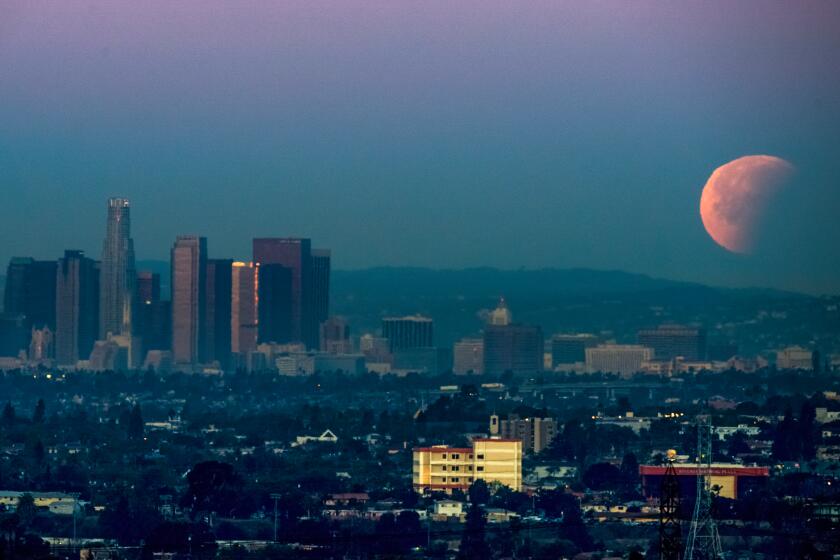New LAPD jail falls victim to budget shortfall
- Share via
For more than four decades, a dreary, two-level jail in a corner of the Los Angeles Police Department’s downtown headquarters has been an unwelcome pit stop for thousands of men arrested in the city each year. Accused of petty theft, murder or anything in between, the Parker Center Jail is where one waits -- sometimes for a few hours, sometimes for a few days -- to see a judge.
Never a pleasant place, the jail has fallen into increasing depths of disrepair and inadequacy over the years. Along with the inmates, it is home to a population of giant cockroaches. Toilets clog frequently and the lighting is more dungeon than modern-day facility. There are no surveillance cameras in the cells or electric locks on the cell doors, said Detention Officer Brian Hollenbaugh.
“The place is a mess,” Hollenbaugh said. “It’s bad.”
So, when taxpayers approved $600 million for new police facilities in 2002, it was an obvious choice to spend a slice of the funds on a new jail.
Now, more than three years and $74 million after construction began, it is becoming increasingly likely that the soon-to-be-completed Metropolitan Detention Center will be unusable because of staffing shortages brought on by the city’s fiscal crisis, LAPD officials said Tuesday.
If no solution is found, the aging, dilapidated Parker Center facility will have to remain operational while the 174,000 square feet of new cell space sits empty.
In a presentation to the Los Angeles Police Commission, Cmdr. Jeffrey L. Greer told members of the civilian oversight panel that the department needs 164 detention officers to operate the sleek, high-tech jail located beside Parker Center.
Only 83 detention officers are required to staff the smaller jail at Parker Center, Greer said, meaning the department needs to nearly double the size of its downtown jail staff.
In addition, 19 detention officer positions at the downtown facility and the several other jails the LAPD runs at its police stations are vacant, bringing the total number of new hires needed to 100.
Even in flush times, such an increase would have been a tall order, but with the city in the grips of a $405-million budget shortfall, it is a staggering request.
The LAPD has been ordered to cut $160 million from its budget and for months, every city department has been under a civilian hiring freeze.
Detention officers, also called jailers, fall under this freeze because they are not sworn officers, but specially trained civilians. To hire more jailers, the LAPD first would have to receive a special exemption from the citywide freeze.
The looming crisis with the jail is only the latest toll the city’s budget woes have taken on the LAPD.
Nearly 1,000 of the department’s civilian employees have already been forced to go on furloughs, taking one unpaid day off every other week.
The Police Protective League, which represents rank-and-file officers, has gone without a contract for three months as city negotiators seek reductions in payroll costs.
With so much up in the air, some City Council members have begun suggesting that the city take a break from Mayor Antonio Villaraigosa’s relentless push to hire 1,000 new police officers.
Councilwoman Janice Hahn said Tuesday that she wants the council to halt recruitment of new officers into the LAPD’s training academy until city officials get a better handle on the budget shortfall.
Councilman Paul Koretz went further, saying the city’s effort to reach a 10,000-officer force is financially “unsustainable.”
“We can’t do it, and we don’t need to do it,” Koretz said
Villaraigosa promised during the 2005 election campaign to add 1,000 officers, enough to bring the LAPD up to a force of 10,181.
In July, the council scaled back the effort and has since been hiring only enough officers to replace those who resign or retire.
LAPD officials are planning to take on a new class of recruits in October, but the council’s Budget and Finance Committee will meet next week to determine whether it can do so again in November.
The Metropolitan Detention Center is scheduled to open Feb. 1. Along with an increase in space, it features high-tech surveillance cameras, a computerized security system and air filtration.
Designed to hold about 550 men and women after arrest and as they await arraignment by a judge, the new jail would be a considerable increase over the current facility, which has room for about 420 men. (Women are currently taken to one of two other LAPD jails).
The need for more staff, however, is far greater than the increased capacity. On any given shift, 62 detention officers would be needed in the new jail -- double the number needed at the current site, Greer said. The dramatic increase in staffing is needed mainly because the facility is broken into several pod areas that require separate staffs, police officials said.
Opening only part of the jail would not be feasible because of security concerns and because there would be too few cells available to house the constantly fluctuating number of suspects, Greer said.
Commission President John Mack directed Greer to more fully explore the idea of raising funds for the jail by leasing space to federal agencies.
Mack and Police Chief William J. Bratton expressed concern over the situation, but reiterated early promises that the department would not resort to using police officers to fill the empty positions.
--
david.zahniser@latimes.com
More to Read
Sign up for Essential California
The most important California stories and recommendations in your inbox every morning.
You may occasionally receive promotional content from the Los Angeles Times.












